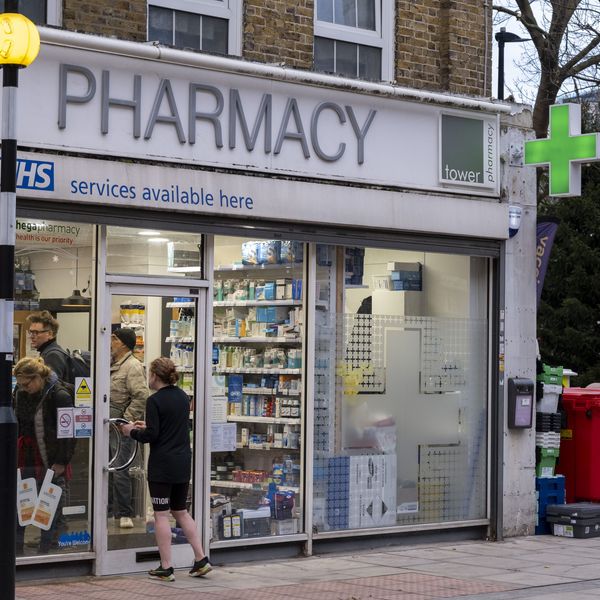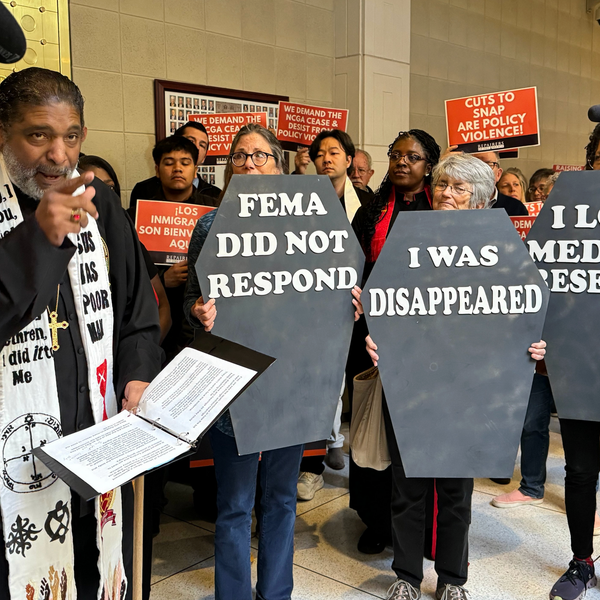UK Doctors Warn TTIP Means Certain Death for Public Healthcare
Physicians say national health service faces lawsuits, bullying, and privatization under contentious trade pact
Doctors in the United Kingdom are warning that passage of the Transatlantic Trade and Investment Partnership (TTIP) will mean certain death for the country's public healthcare system, opening the door for privatization and lawsuits from the United States' for-profit medical industry.
Speaking at the annual meeting of the British Medical Association (BMA) in Liverpool on Tuesday, Dr. Henry McKee of Belfast warned members that "if there is anything resembling an [National Health Service] by the time this treaty is in negotiation, it won't survive this treaty."
"The correct motion is to kill this treaty dead, not to tolerate it sneaking in and mugging us," he added.
McKee's comments came as BMA members voted in favor of lobbying the UK government against the trade agreement, advocating for a provision that would remove healthcare from the contentious pact. In a vote earlier this month, the European Parliament backed a similar recommendation though it is up to the official European trade negotiators to demand such exclusions.
The TTIP and other pending global trade deals--the Trans-Pacific Partnership (TPP) and the Trade in Services Agreement (TISA)--have come under fire for their corporate-friendly provisions, which many warn will promote business interests above the environment, workers rights, and public health. Particularly, the investor-state dispute settlement (ISDS) provision would allow multinationals to sue governments for alleged loss of profits due to industry regulations.
In an address during the BMA meeting, Edinburgh physician Gregor Venters also warned that the "introduction of private providers into public services" will "allow the big American corporations to interfere with the NHS."
Europeans are concerned that the United States' lax rules and regulation of genetically engineered, or GMO, crops and other lower health standards will allow for a "race to the bottom" in global food and health standards.
"Private corporations could use the process to bully governments into dropping legislation to improve food standards," he explained.
In a related development, recently leaked sections of the TPP revealed how the deal would give big pharmaceutical companies more power over public access to medicine by undermining government efforts to subsidize pharmaceuticals and medical devices, effectively crippling public healthcare programs worldwide.
Earlier this month, faced with growing public and internal opposition, European Parliament President Martin Schulz canceled a vote on the Parliament's recommendations for the treaty. Negotiations are set to continue in July.
Meanwhile, on Tuesday, the U.S. Senate voted to back Fast Track trade promotion authority, which enables President Obama to ratify international trade deals with only an up or down vote by the U.S. Congress, essentially guaranteeing the passage of the TPP and TTIP.
An Urgent Message From Our Co-Founder
Dear Common Dreams reader, The U.S. is on a fast track to authoritarianism like nothing I've ever seen. Meanwhile, corporate news outlets are utterly capitulating to Trump, twisting their coverage to avoid drawing his ire while lining up to stuff cash in his pockets. That's why I believe that Common Dreams is doing the best and most consequential reporting that we've ever done. Our small but mighty team is a progressive reporting powerhouse, covering the news every day that the corporate media never will. Our mission has always been simple: To inform. To inspire. And to ignite change for the common good. Now here's the key piece that I want all our readers to understand: None of this would be possible without your financial support. That's not just some fundraising cliche. It's the absolute and literal truth. We don't accept corporate advertising and never will. We don't have a paywall because we don't think people should be blocked from critical news based on their ability to pay. Everything we do is funded by the donations of readers like you. Will you donate now to help power the nonprofit, independent reporting of Common Dreams? Thank you for being a vital member of our community. Together, we can keep independent journalism alive when it’s needed most. - Craig Brown, Co-founder |
Doctors in the United Kingdom are warning that passage of the Transatlantic Trade and Investment Partnership (TTIP) will mean certain death for the country's public healthcare system, opening the door for privatization and lawsuits from the United States' for-profit medical industry.
Speaking at the annual meeting of the British Medical Association (BMA) in Liverpool on Tuesday, Dr. Henry McKee of Belfast warned members that "if there is anything resembling an [National Health Service] by the time this treaty is in negotiation, it won't survive this treaty."
"The correct motion is to kill this treaty dead, not to tolerate it sneaking in and mugging us," he added.
McKee's comments came as BMA members voted in favor of lobbying the UK government against the trade agreement, advocating for a provision that would remove healthcare from the contentious pact. In a vote earlier this month, the European Parliament backed a similar recommendation though it is up to the official European trade negotiators to demand such exclusions.
The TTIP and other pending global trade deals--the Trans-Pacific Partnership (TPP) and the Trade in Services Agreement (TISA)--have come under fire for their corporate-friendly provisions, which many warn will promote business interests above the environment, workers rights, and public health. Particularly, the investor-state dispute settlement (ISDS) provision would allow multinationals to sue governments for alleged loss of profits due to industry regulations.
In an address during the BMA meeting, Edinburgh physician Gregor Venters also warned that the "introduction of private providers into public services" will "allow the big American corporations to interfere with the NHS."
Europeans are concerned that the United States' lax rules and regulation of genetically engineered, or GMO, crops and other lower health standards will allow for a "race to the bottom" in global food and health standards.
"Private corporations could use the process to bully governments into dropping legislation to improve food standards," he explained.
In a related development, recently leaked sections of the TPP revealed how the deal would give big pharmaceutical companies more power over public access to medicine by undermining government efforts to subsidize pharmaceuticals and medical devices, effectively crippling public healthcare programs worldwide.
Earlier this month, faced with growing public and internal opposition, European Parliament President Martin Schulz canceled a vote on the Parliament's recommendations for the treaty. Negotiations are set to continue in July.
Meanwhile, on Tuesday, the U.S. Senate voted to back Fast Track trade promotion authority, which enables President Obama to ratify international trade deals with only an up or down vote by the U.S. Congress, essentially guaranteeing the passage of the TPP and TTIP.
Doctors in the United Kingdom are warning that passage of the Transatlantic Trade and Investment Partnership (TTIP) will mean certain death for the country's public healthcare system, opening the door for privatization and lawsuits from the United States' for-profit medical industry.
Speaking at the annual meeting of the British Medical Association (BMA) in Liverpool on Tuesday, Dr. Henry McKee of Belfast warned members that "if there is anything resembling an [National Health Service] by the time this treaty is in negotiation, it won't survive this treaty."
"The correct motion is to kill this treaty dead, not to tolerate it sneaking in and mugging us," he added.
McKee's comments came as BMA members voted in favor of lobbying the UK government against the trade agreement, advocating for a provision that would remove healthcare from the contentious pact. In a vote earlier this month, the European Parliament backed a similar recommendation though it is up to the official European trade negotiators to demand such exclusions.
The TTIP and other pending global trade deals--the Trans-Pacific Partnership (TPP) and the Trade in Services Agreement (TISA)--have come under fire for their corporate-friendly provisions, which many warn will promote business interests above the environment, workers rights, and public health. Particularly, the investor-state dispute settlement (ISDS) provision would allow multinationals to sue governments for alleged loss of profits due to industry regulations.
In an address during the BMA meeting, Edinburgh physician Gregor Venters also warned that the "introduction of private providers into public services" will "allow the big American corporations to interfere with the NHS."
Europeans are concerned that the United States' lax rules and regulation of genetically engineered, or GMO, crops and other lower health standards will allow for a "race to the bottom" in global food and health standards.
"Private corporations could use the process to bully governments into dropping legislation to improve food standards," he explained.
In a related development, recently leaked sections of the TPP revealed how the deal would give big pharmaceutical companies more power over public access to medicine by undermining government efforts to subsidize pharmaceuticals and medical devices, effectively crippling public healthcare programs worldwide.
Earlier this month, faced with growing public and internal opposition, European Parliament President Martin Schulz canceled a vote on the Parliament's recommendations for the treaty. Negotiations are set to continue in July.
Meanwhile, on Tuesday, the U.S. Senate voted to back Fast Track trade promotion authority, which enables President Obama to ratify international trade deals with only an up or down vote by the U.S. Congress, essentially guaranteeing the passage of the TPP and TTIP.

